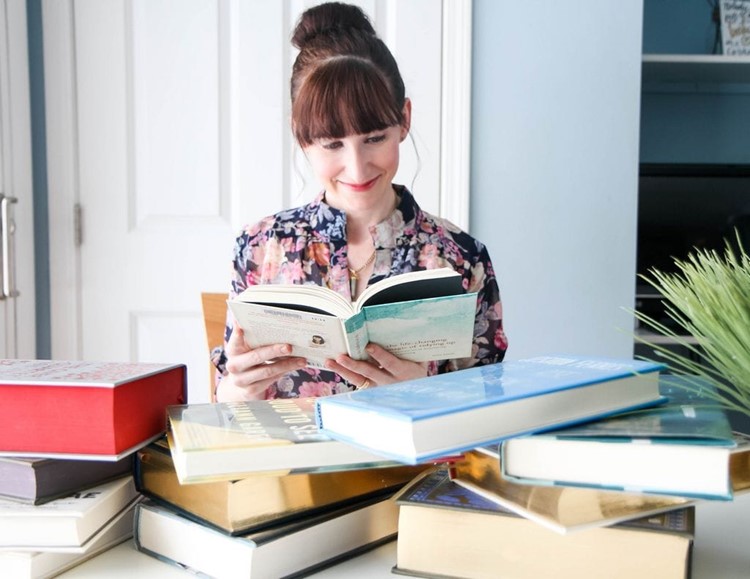
I am so honored to be interviewing Gilly Macmillan today to talk about her debut novel, What She Knew. I am always game for a good thriller, but can we be honest and say that many rarely deliver? It is tough to surprise seasoned readers, isn’t it? Well, I am so happy to say that this one really delivers in the thriller category and kept me guessing until the final page. I am not the only one that fell in love with this book. What She Knew is an IndieBound Pick, a Target Book Club Pick, A LibraryReads List Pick, and a Featured Book for Book-Of-The-Month Club for December 2015.
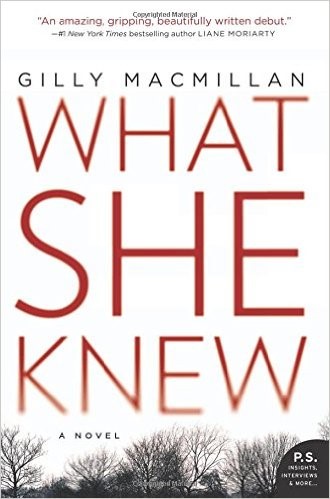
In a heartbeat, everything changes…
Rachel Jenner is walking in a Bristol park with her eight-year-old son, Ben, when he asks if he can run ahead. It’s an ordinary request on an ordinary Sunday afternoon, and Rachel has no reason to worry—until Ben vanishes.
Police are called, search parties go out, and Rachel, already insecure after her recent divorce, feels herself coming undone. As hours and then days pass without a sign of Ben, everyone who knew him is called into question, from Rachel’s newly married ex-husband to her mother-of-the-year sister. Inevitably, media attention focuses on Rachel too, and the public’s attitude toward her begins to shift from sympathy to suspicion.
Macmillan delivers a solid thriller that left me guessing right up until the final pages. Narration is done well through the eyes of the detective, the mother, and social media outlets who tell the story of an eight year-old boy who goes missing on a walk with his mother in the woods.
The author weaves enough loose ends to create a well curated variety of suspects that lead you down the wrong trails in the woods yourself and creates great tension as the stability of the child’s own mother comes into question.
I included this book in our February Must-Reads list!
Grab your coffee and let’s settle in with Gilly for the scoop behind her spellbinding thriller, What She Knew.
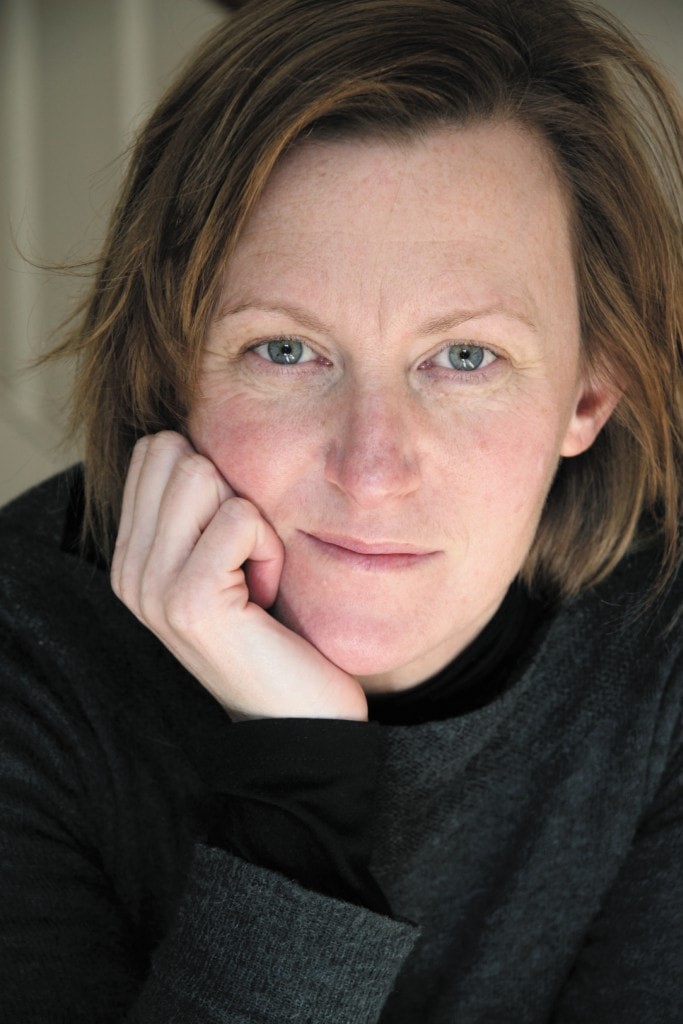
As a mom, your book really illustrates some of my worst fears, losing and not knowing where your child is has to be one of the scariest feelings in the world. As a mom of three, which scene was one of the hardest for you to write and do you think you would have responded in the same ways that the fictional mother, Rachel, did?
So many scenes in What She Knew were difficult to write from an emotional point of view, but the press conference was definitely one of the hardest. It’s the moment when Rachel’s private nightmare goes public, and I found it heart-wrenching to put her in that situation. She has to gather herself, at one of the most raw and difficult moments that she’ll ever have to live through in her life, and face the media, and the wider world and also remain composed enough to address somebody who may have taken her child. I lived every moment of that scene with her as I wrote it, and it was painful.
It’s interesting that you should ask whether I would have responded in the same way as Rachel, because that’s something my husband and I discussed! I think I would certainly share many of her feelings, and I channeled much of myself into her emotional reaction to her son’s disappearance. However, I do have a very practical side and I might have been more careful than Rachel to try to keep my feelings under control when I needed to, and I might also have felt driven to try to do something practical, as Rachel’s sister does in the novel. Having said that, however, I suspect that when we’ve only ever been on the outside of an extreme situation like the one Rachel finds herself in, we can never really know for sure what it feels like to be on the inside, and how we would behave. We can only hope we would do the right things.
You attacked research for your book in such a unique way, starting by not researching the topic at all when writing the first draft of this book and then building that out in later drafts. Was this intentional and do you think this created a better layering to have a more uninformed stance with your first draft?
The decision to do no research for the first draft of What She Knew was intentional, and came about because I was time-short. My three kids were all settled into school, so I had a bit of time on my hands for the first time in years as I’d been caring for them more or less full-time, but money was getting tight, so I knew I only had a small window to have a go at writing a book before I needed to get a ‘proper’ job. This meant that I couldn’t afford to spend lots of that time researching, so I decided to write about something that I knew (motherhood), locate it in the city I live in (Bristol, UK), and write 1,000 words a day until I had a completed book (every day I recorded how many words I’d written on a sheet of paper that became increasingly dog-eared over the months as the total increased).
What resulted from that effort was a draft of the book that told the story entirely from Rachel’s point of view. It was a messy draft, and I had inevitably made lots of the mistakes you might expect from a rookie writer, but I sent off the first three chapters and they were just enough to get me an agent.
Being signed up by an agent who had confidence in my work – even though she also had a lot of issues with it! – was the thing that finally made me take myself a bit more seriously as a writer. With my agent’s help, and realizing that this might be my one shot at being a writer, I really got down to work on the manuscript. I began to research the subject in earnest, and work on layering up the novel, and I decided to create the detective’s character, as I felt that Rachel’s voice needed a counterpoint, somebody who would take a more professional view of the case and let the reader see into the investigation.
In retrospect, although some might say that it was a very disorganised way to write a book, I do believe that the way I worked helped me to get Rachel’s voice down in a really direct way right from the outset. I hope that means that, in spite of all the changes and edits that have taken place since the first draft, Rachel’s narrative hasn’t lost its power as the honest, unfiltered words of a mother whose child has disappeared and whose story forms the spine of the novel.
When Rachel has to make a statement before the press about her child going missing, she goes off script and attracts the media in a negative way, ultimately branding her as a bad mom. There was something about this press scene that mimicked that moment in Gone Girl where Nick’s body language and motives are pulled into question after his hearing. Media and the way they villainize this mom not only come into play here, but also are a big part of this book with a blog and social media commentary throughout. Why do you think we are so intent on victimizing people and why did you think building a social media outlet was such an important addition to this book?
Part of my process of developing the book after the first draft was to comb over all of the fine details that I wanted to be as accurate as possible. I spoke to police officers and researched child abduction and I also paid careful attention to real life cases. There were two of these, both high profile, that took place in the UK while I was writing the novel. In the first instance I experienced these cases as I always had done, ie via traditional media reporting, but as I dug a little deeper I discovered that the cases were also being discussed by individuals all over social media and in the comments sections attached to online newspaper reports. I’d never really paid attention to that stuff before but it struck me straight away that if I included this kind of thing in the book, it could be a very interesting to let the reader experience the case of Ben’s abduction in the way that they might in real life, alongside the versions of events that they learn from my two narrators.
What made my decision easy in the end, was that the comments and social media pages that I read were alive with opinion, fizzing with it, and I was surprised at the strength of people’s feelings and how polarized opinion was, and how much they judged the people involved even though they only had access to a tiny amount of verified information. It was too powerful to ignore. I knew that if I was Rachel I would have found it tremendously difficult to know that it was going on out there, in addition to the very private pain I was feeling and so social media had to almost become a character in its own right.
I’ve thought a lot about why people victimize others in this way. I think it’s often a combination of factors, but there are a few which stand out to me. First and foremost, the internet offers little or no accountability for what we say online, so people behave more badly than they might otherwise. Chat forums where people state their opinions very bluntly, combined with sensationalist headlines, can heighten emotions and feelings in a large group of people very quickly. Combine that with the speed at which things can travel on the internet and the fear and misunderstanding that can spring from emotional, unreasoned debate and an aggressive pack mentality can develop swiftly. I also think that our ability to comment freely online, and engage with others easily and anonymously if we wish, makes us more susceptible to feeling emotionally involved in events that are really nothing to do with us, and that in other circumstances we might keep a respectful distance from. These factors all combine to make Rachel a victim of the internet, as well as of a crime, in What She Knew.
I understand that you actually crafted three endings for this book. What was it about the ending that you struggled with and why do you think the one you chose for this novel was the most satisfying conclusion for your story?
The ending posed a challenge in many ways. As a mom, in my very first draft, I veered away from a realistic ending, because I wanted to make everything nice for everybody, because that’s what we do, right? We tuck everybody up at the end of the day and tell them to have sweet dreams. However, I was advised that the too-nice ending didn’t sit well with the rest of the story, and readers might feel dissatisfied, so I took advice from my agent and experimented with other options. The final choice of ending came down to the fact that What She Knew is at its heart a story about a terrible crime, but also about a mother, and a child, and a detective who cares, and my desire to get as much veracity into the novel as possible. For me, the ending we finally settled on seemed to do justice to both the story, and the characters, and also felt truthful, which was so important to me. I’m a big reader myself and I like to feel that an author hasn’t cheated me in the end, but has stayed true to the story. It’s been really interesting since publication to hear reader’s views on the ending.
I know that a lot of research went into this book from police investigations to missing children cases. What was the most surprising fact you discovered while preparing this book and has any of the research shaped any new viewpoints for you on this topic?
When I first sat down for a cup of coffee with some real (retired) detectives I described the set-up at the beginning of the book when Ben goes missing, as I had written it in an early draft. Ben goes missing late on a Sunday afternoon in the woods, as darkness is about to fall, and I told the detectives that in response to his disappearance I had fictionally mobilized air support, search teams with dogs, and on horses, and had a vast amount of manpower combing the area within an hour or two of the call being made to police. They were aghast! I still remember their faces across the table now. No, they told me, at dusk on a Sunday evening in the woods, the police would certainly attend, but you would probably only get a couple of uniformed officers and if you were lucky you might get one extra officer with a dog, but that would be it! This was mostly because of the darkness, but also because of budgets and available manpower at that time.
Their advice was a reality check for me and I had to rewrite all of the scenes at the start of the book. I realized I had assumed too much, and I actually knew almost nothing about police procedure or about many of the challenges of detective work. Needless to say, we didn’t just have one cup of coffee. A few hours, and a few rounds of sandwiches and many more pots of coffee, and some follow-up emails later, I had learned so much from them about the police and how they operate and I found all of it fascinating. They gave me a great deal of practical advice but what I also took from them is how much they cared about their jobs and how every case is complicated and challenging and sometimes very frustrating for even the most dedicated detective, and I wanted to be sure to do the demands of the profession justice, and to bring some of that realism into the story. It added a whole new dimension to the book, and in particular to my detective’s story.
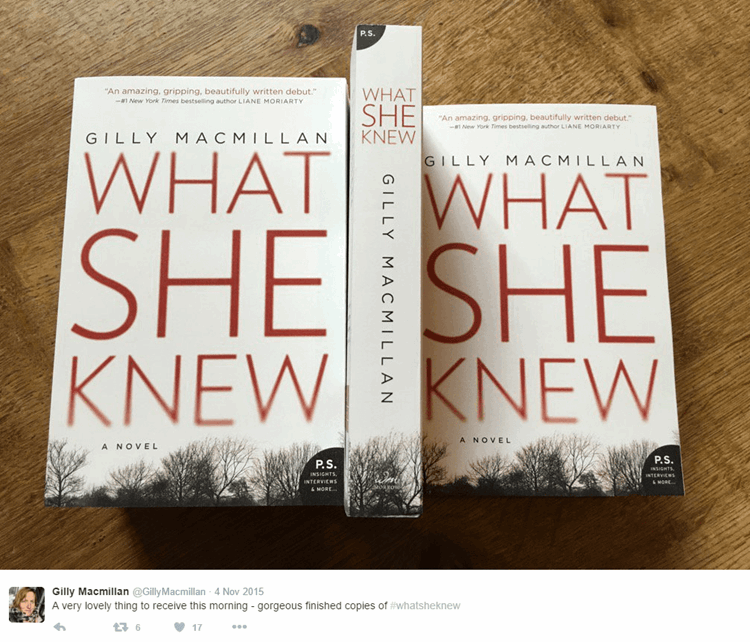
Many moms feel like they have a book in them, but few of us feel we have the time to work on our own dreams while juggling a busy life with our family. What prompted you to move forward on this dream and could you share a time management strategy that helped you finally to get moving on your first book?
As I said above, it was a sense that I had a one-off window of opportunity to try to do this that really spurred me on, because I knew that I wouldn’t dare to quit a paying job to write a book, so it was now or never. My time management took a lot of work, but the thing that really got me writing was to make a rule that I couldn’t do anything else – no tidying, laundry, dog-walking, surface-wiping, etc. – until I’d written 1,000 words each day. I’m not good at working in the evening when I’m tired (I wish I was!) so that meant I would sit down and start to write the minute I got back from dropping the kids off at school in the morning, when my head was clear, and I had a big incentive to get on with my word count so that I could leave my desk with enough time to get everything else done. My social life suffered a bit, as did household organization, and I had to pull away from being involved in school associations and that sort of thing, but it was worth it.
My advice to anybody else would be to try to carve out an amount of time, however small, where you can write each day and guard it fiercely. That way, even if you can only find time to write a few hundred words each day, you are progressing, and you will be able to make it to the end. Keep track of that word count too, because it’s encouraging to see it rising. Also – don’t beat yourself up if your first draft isn’t a polished work, or even close to one. Once, it’s done, it gives you something to improve and work on. Often, the whole process felt like an exercise in holding my nerve as much as anything else so that would be my advice too: hold your nerve, and don’t assume that it can’t be you.
I understand that you are writing another book that will include another case with DI Jim Clemo. Will you be referencing the case from this book at all? Can we expect Jim to be a bit damaged from how he felt he handled this case?
Yes, I am! I’m currently working on my third novel and this will be a sequel to What She Knew and I’m delighted to say that Jim will be back. It’s really wonderful to revisit Jim’s character, as I’ll admit that I’m very fond of him, and starting to write him again was like visiting an old friend. It’s still early days for that novel, but I will certainly be referencing the Ben Finch case from What She Knew and exploring the impact that it’s had on Jim as he tries to move forward with his life, and his career.
Before that book hits the shelves, though, my second novel will be out in Fall 2016. It’s a standalone book called The Perfect Girl and is about a girl called Zoe, who is a 17-year-old musical prodigy with a genius IQ and a secret in her past that she and her mother will go to extraordinary lengths to protect. The book is about one night, where Zoe is giving a performance that her mother, Maria, has been planning for months, but by midnight, Maria is dead. Like What She Knew, it’s a book with family and parenting themes, and asks questions about how far we push our children and ourselves in pursuit of that perfect family ideal, and how often life offers us second chances if we get things wrong.
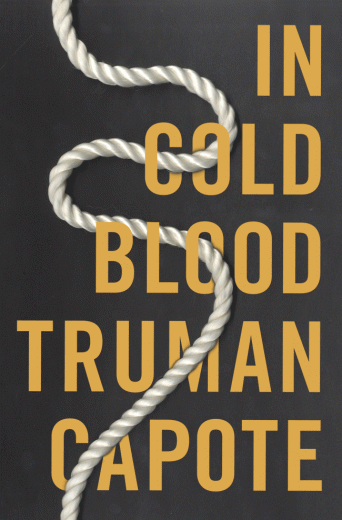
The true crime genre is something that many of our readers are into right now as we read lots of books, listen to podcasts, and watch documentaries on true crime. Do you read this genre or utilize any true crime cases to write your books? Any recommendations for true crime fans?
The first true crime book that I ever read was Truman Capote’s In Cold Blood. I loved it, and was absolutely gripped by it. I’m not sure I’ve read much true crime since then, though I read a lot of crime fiction as you might expect, and I’m always up for a good recommendation! Recently, I’ve found myself addicted to the Serial podcasts and also the Making of a Murderer documentary and I recommend those very highly if you’re into true crime, though I expect many of your readers will know them already. The intricacies of the cases, and the way you get to know something about the personalities involved is what hooks me, and I’m struck by just how often truth can be stranger than fiction.
I am always curious when a book first is published in another country and then is published here if any changes have to be made. Did anything have to be changed in the US publication that maybe Americans might not get?
We changed very little, as the US publishers wanted to keep an English feel to the novel. There were the usual obvious swaps of words like ‘pavement’ for ‘sidewalk’ and that sort of thing, but that was extent of it within the novel. The biggest change was the title. In the UK the book is called Burnt Paper Sky, which is a reference to a description in the book of the moment when Ben goes missing and his mother realizes that the sky above is darkening at the edges like burning paper. The US publisher felt that they would prefer something less opaque so they came up with What She Knew and I was very happy to approve that as I thought it was a terrific title.
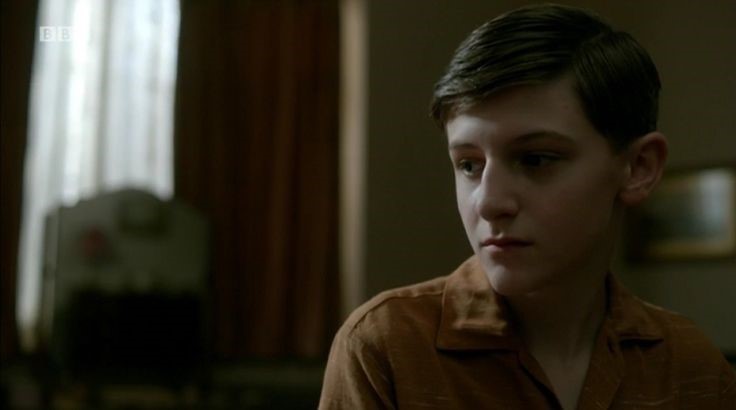
I read in your bio that not only are you juggling the usual mom schedule while writing a book, but your son is also a cast remember on the BBC TV show, Call the Midwife. How did your family stumble into this opportunity and what has that been like for you as a mom?
‘Stumbled into’ is the right description for our involvement in Call the Midwife, though it has been and remains an amazing experience for my son. A few years ago we were facing a long summer at home and I was looking out for things for my kids to do when a friend emailed with an opportunity for boys to audition for a part in the choir in a local theatre production of the play Coram Boy. It looked like fun, and my son is musical, so we went along one day, and he took his violin as they said they also wanted to see young violinists. The outcome was that after two auditions, and in spite of almost no drama experience, he was offered one of the main roles! It was a wonderful surprise and a wonderful experience: months of rehearsal that culminated in a huge Christmas production with performances over a few days in front of thousands. It was at one of those performances where the director of the first series of Call the Midwife spotted Max, and asked us if he’d like to audition for the role of the doctor’s son, Timothy Turner, in Call the Midwife, as he had a good resemblance to the actor who played the doctor. Originally, it was just supposed to be a single day of work filming just one scene in the Season Two Christmas Special, so we agreed, as we thought it would be a fantastic experience. Since then however, Max’s role has grown as the show has, and shooting for the sixth series begins soon, which will be Max’s fifth year of involvement. He’s in fewer episodes now that he’s older, as we have to limit his availability for shooting to make sure it doesn’t have a negative impact on schoolwork or musical interests, but he still loves every minute of it.
This is such a hard question! There are so many books I could list, but I’m going to go with Paula by Isabel Allende. The book tells the true-life story of the author’s daughter’s sudden and unexpected illness, which befalls her when she’s a young adult. That story is interspersed with the history of their family and the story of Isabel Allende’s own extraordinary life. It’s a powerful, heart-wrenching account of a mother’s love for her daughter, and one woman’s path through all of the big moments in life: love, motherhood, work, grief, joy and family. It’s raw and honest, powerful and heart-wrenching, and beautifully told.
You can connect with Gilly Macmillan on her website or through Facebook! I’m always thankful for these moments with writers and I hope you will pick up this amazing book! You can always connect with me on GoodReads, through our books section of our site, and you can read our entire Sundays With Writers series for more author profiles. Happy reading, friends!
*This post contains affiliate links!